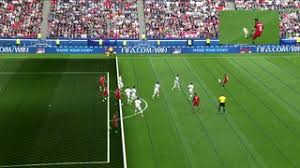By Andrew Warshaw in Zurich
March 4 – So now it’s official. No turning back. But are there still more questions than answers? As anticipated, video assistant referees are set to be used at this year’s World Cup in Russia after football’s lawmakers, the International FA Board (IFAB), voted to roll out the technology when they met at FIFA headquarters in Zurich on Saturday.
For a brief hour or so, when the meeting was unexpectedly extended, there was a frisson of tension about whether perhaps IFAB members had changed their minds and were about to shock us all.
But then came the announcement from FIFA that VARs had been unanimously approved on a permanent basis following two years of trials in a number of Continents and countries, and in the Confederations Cup last year in Russia.
Leagues and competitions must now apply to IFAB individually to implement the system. Only if they satisfy strict criteria will they be allowed to use the technology. As far as the World Cup is concerned, FIFA president Gianni Infantino said a concrete decision will be taken at a meeting of the FIFA Council on 16 March.
But it’s pretty much a foregone conclusion.
“As of today, video assistant refereeing is part of football,” Infantino said. “The most important competition in the world, which is the World Cup, in 2018, can certainly not afford to be decided on a potential mistake of a referee.”
One of the biggest concerns over VAR is that the flow of the game is interrupted too much. Another is how to convey VAR decisions to those watching who half the time have no idea about what’s going on. Hence one reason why UEFA is refusing to apply VARs in the Champions league next season.
UEFA and others are also concerned that mere debatable incidents rather than mistakes that are “clear and obvious” are being taken out of the hands of the referee.
FIFA says it is working on all these elements for the World Cup when rugby-style giant screens will be used. “Our idea is that after the final decision is taken by the referee on the pitch we would like to show in the stadium the selected replay that was used by the referee and the VAR outcome,” said Johannes Holzmuller, head of FIFA football technology innovation.
Saturday’s decision was made after IFAB was presented with the results of independent analysis conducted by Belgian university KU Leuven. “I would say to the fans, players and coaches that it will have a positive impact,” said Infantino. “That is what the results of the study show.
“From almost 1,000 live matches that were part of the experiment, the level of the accuracy increased from 93% to 99%. It’s almost perfect.”
France’s Ligue 1 is to introduce VARs from next season, while the Bundesliga will decide on 22 March whether to follow suit. But the English Premier League is taking a softly-softly approach, just like UEFA. Only domestic cup competitions in England have been experimenting with the technology and even then, only a handful of games.
English FA chief executive Martin Glenn said he had no problem with the Premier League taking its time. “If they do choose to not implement it then it won’t be a fundamental rejection of VAR – it will be a case of giving it more time,” he said.
While the whole idea of VARs is to reduce unfairness caused by “clear and obvious errors or serious missed incidents” the system was described as “an absolute shambles” during Tottenham Hotspur’s FA Cup fifth-round replay win over Rochdale last week.
Glenn acknowledged several areas needed radical improvement. “We have to speed up reviews, communication to the crowd has to be better and we need to be much more comfortable with what are clear and obvious errors,” he told reporters.
“What we have seen in Italy and Germany is that the VARs are so desperate to get everything right and support their colleagues on the pitch that are probably calling out too many things. It’s clearly a learning curve. We all agree there is more work to be done. But it’s very compelling. You have to believe that if it works in Spain, Italy and Germany, it will work in England.”
The chief executive of the Welsh FA, Jonathan Ford, confirmed he had been “sceptical” beforehand but had been won over by “overwhelming” evidence from about 1,000 live matches worldwide that had trialled VAR.
Data collected from those games showed an improvement in decision-making accuracy from 93% to almost 99%, and that the number of refereeing mistakes had fallen from one in every three matches without VAR to one in every 19 with the system. Average playing time lost as a result of using VAR was less than one minute, officials were informed.
With FIFA holding half of IFAB votes and the four British associations one each, it would have needed six votes to pass VARs into law. In the end the decision was unanimous with Scottish officials having to be linked up by phone after missing the historic meeting because of heavy snow back home. But Irish FA general secretary Patrick Nelson commented: “The time for experimenting is over. Of 132 annual meetings of IFAB, this has to be in the top 10.”
IFAB technical director and former World Cup referee David Elleray said all stakeholders had to be patient and allow teething troubles to be ironed out.
“A trial by its necessity involves trial and error,” Elleray stressed. “Yes we have to improve communication but our strapline has always been minimum interference, maximum benefit. We believe the system is delivering and that significant progress is being made. If I’d said two years that we could reach where we are now in terms of refereeing accuracy, you’d have carried me out in a white coat.”
Contact the writer of this story at moc.l1745283646labto1745283646ofdlr1745283646owedi1745283646sni@w1745283646ahsra1745283646w.wer1745283646dna1745283646

